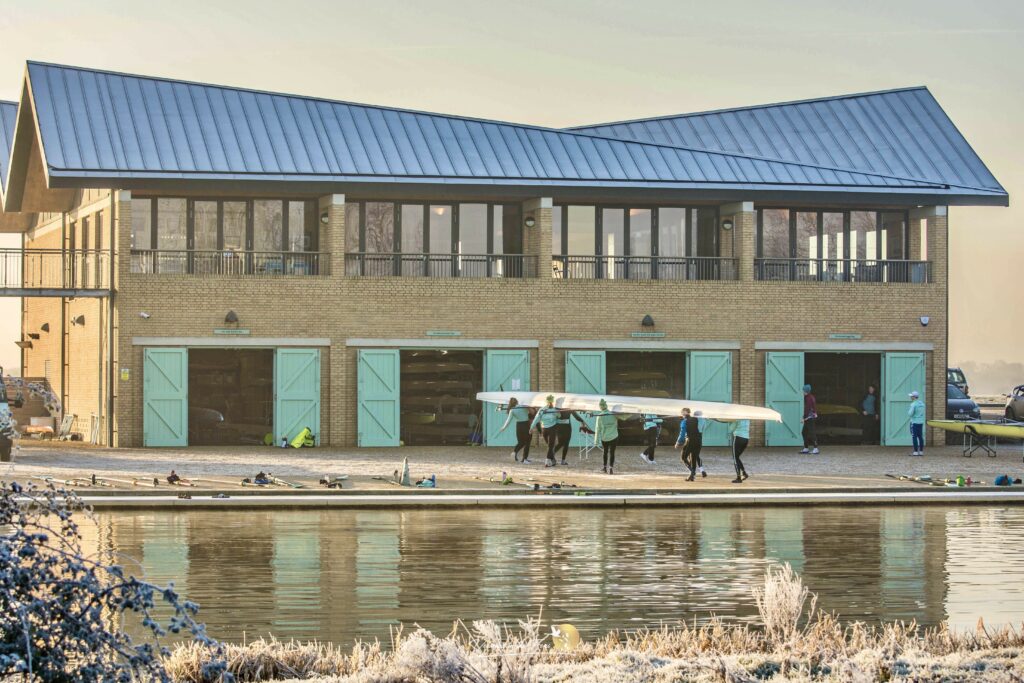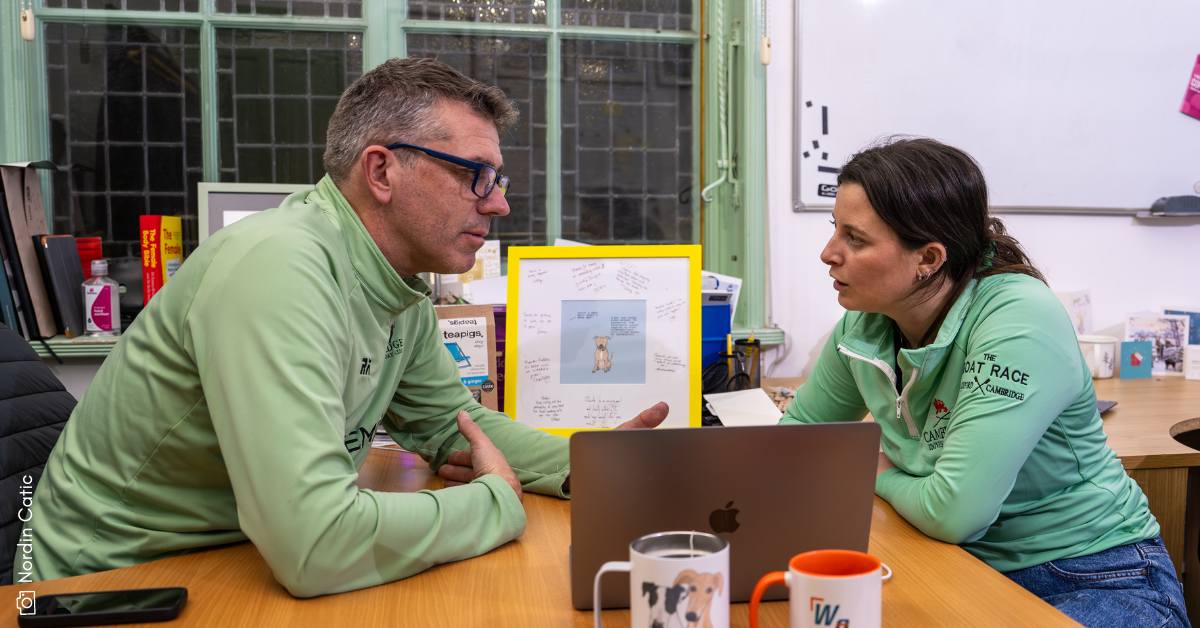Paddy Ryan is chief women’s coach at Cambridge University Boat Club (CUBC) and has been part of the team since 2013, when he joined as the assistant coach of Cambridge University Women’s Boat Club (CUWBC), years before the three separate university rowing clubs unified. Matilda Horn joined CUBC in 2023, as assistant women’s coach and brings with her a wealth of experience in coxing as well as rowing.
Firstly, what are the important aspects of your respective roles and what is your vision for the rowers?
Matilda: “My role predominantly includes coaching Blondie (the reserve boat), the spares, the coxes, and running the development programme. I aim to provide a balance for Paddy, reinforcing the technical model, the expected behaviours and the positive, supportive culture whilst also invigorating fun and light-heartedness to the seriousness of the task ahead. I believe we are united in our goal to empower the rowers to learn and be curious.”
Paddy: “I totally agree that we are inline with our vision for the future of this team and also in working out how to impact women’s rowing in a positive way. My role differs in that I need to be thinking more ‘big picture,’ to define the direction of our rowing style and selection. It’s my job to ensure we have the experts in the background to support our coaches’ and athletes’ wellness, both physical and mental, and to lead on standardising the fleet and other necessary equipment purchases.”
Matilda, what have you brought to CUBC with your experience as an Olympic cox?
“I believe I bring an understanding of how to row a women’s eight and some experience of working with the media on a big stage. One of the things I most value from my journey through the GB rowing team is gaining perspective on what is important to me and on how to ride the wave of the highs and lows, and I hope to support the women through theirs. I also bring a developed understanding of leadership skills which I have worked on throughout my time in the GB squad as well as since.
I have continued the coxing coaching sessions Autumn (Autumn Mantell) began when she was in this role. To the coxes I bring knowledge of what is important as a cox, an understanding of boat management and handling, a vast knowledge of the tideway, and race experience.”
And can you tell us about the women’s strength and conditioning (S&C) programme and explain why it’s so important to have a programme that’s specific to women?
Matilda: “I love that the women here have access to the most inspiring strength and conditioning coaches. I have had the pleasure of working with S&C coach Nicole (Viktus) in the GB Rowing Squad – she brings incredible knowledge and insight of coaching female athletes to the programme she writes. Matt, our land S&C coach (Viktus) and Nicole bring an understanding of the performance benefits, specificity in the weights room, for women, particularly around the core, trunk and upper body. Matt’s technical coaching on the ground is essential for the connection between their land training and their technique on the water.”
Paddy: “We’re learning to look at women on their own, not as small men, so engaging with Nicole and her business Viktus was an incredible opportunity to work with one of, if not the most, experienced S&C coach in the female sphere of S&C and female rowing.
Matt’s passion for rowing combined with Nicole’s mentoring has really connected the language that we use on the water with the language in the gym. A basic but often an area I feel is overlooked.”
Paddy, is it relevant that Matilda coaches both squads? Is this an evolution of having a unified club?
“In regards to coxing?
It wasn’t in her job description, but Matilda opened up the opportunity to the men’s coxes via Rob Baker (chief men’s coach) and most of them attend regularly. Is it an evolution of the unified club, so it’s a great question and it’ll be interesting to see how we can support each other in other areas. The programme is very busy from September to Boat Races, so having opportunities is limited but when we have expertise, we should absolutely share them. Something for us to continue to explore.
When the squads can do pieces together it adds a good perspective and helps the athletes look beyond an internal ranking. This was especially useful this season with the cancellation of the Fours Head, which is one of the few opportunities to see how we are going against the rest of the country.”
Matilda, if the unified Club is an ‘evolution,’ how else do you think the Club will evolve in the future and why?
“I think one of the attractive things about CUBC is that it is a very traditional boat club. Its priorities haven’t changed in the past ~200 years, whereas other clubs (and even national teams) change priorities each year. It was an obvious thing to do for the men’s and women’s teams to fall into one club for a multitude of reasons. I was part of the University of London Boat Club just after they became fully integrated. I think financial constraints, space and schedules are the biggest limitation in further integration of the club at this point in time.
One area I could see benefit in is talent identification, especially with ‘home-grown’ rowers, expanding their opportunities through gaining a degree and rowing experience by doing a Boat Race. This would make for wonderful stories but more importantly, would benefit those that wouldn’t necessarily have seen Cambridge University as an option. Another area is para-rowing, not currently offered at CUBC and is something I think that could really benefit the student body and open the sport further.”
And can you tell us about training at Ely? Is there much competition across squads?
Matilda:
“Training at Ely is fantastic, not only is the stretch of water wonderful (and barely ever un-rowable) but the boathouse has a great amount of space for the men and women. We try to train at separate times to continue to make the most out of the water and ensure we don’t wash each other down too much with our launches, however, we also have the benefits of being able to do pieces together creating an excellent community for us to compare using percentages and strive for more speed as a team.”

How important is it to have the training facility at Ely and what makes it such a great facility?
Paddy: “The boat house, to me, was like winning the lottery! We can always look for improvements with it, but I remember boating from the little boatman’s bay at King’s Ely School, with questionable heating and a small pontoon, and trying to get all crews on the water for some meaningful training.
Honestly, it’s life-changing to have heating, a kitchen, a warm up space, an office, a meeting room, changing facilities and showers. And then we have the boat bays, a workshop where we can work on boats and bays that are wide enough to work around an 8.
Then there is our water which I think is some of the best in the country. It’s been heartbreaking to watch the floods across the country, but we haven’t lost a day of training. These are essential for us to continue to create crews to their best potential.”
Matilda: ”I can’t speak for what it was like before I arrived but I have heard the stories of the previous tin shed the rowers trained from and I can only imagine how the facilities available to us now at the Ely boathouse have changed the game! As Paddy highlights, the space available to us is fantastic, allowing us to keep the equipment to such a high standard and office space to work in. When you spend the majority of your training time in the dark and cold, being able to be warm right up until you hit the water and then get straight into the showers before heading off to lectures, is something the athlete’s will never take for granted and massively reduces injury and illness.”
Paddy, what, if anything, have you done differently this year to prepare the squads?
“Not a huge amount to be honest. Probably the biggest change is being more aware of the balance of the squad – with more athletes coming from colleges and fewer from schools, universities or international teams than in previous years. So we’ve seen more emphasis on exploring the area of risk taking. Matilda has also done some valuable work on understanding leadership and its different forms.
So far I am very impressed with the physical strength and speeds we are creating. Now we need to keep working on our boat skills to ensure the physiology transfers not into the fun fast stuff but the base pace, so understanding the skills that help us not slow down.”
Paddy, how did it feel to win last year and to have been part of Cambridge completing a clean sweep against Oxford?
“This is a strange one as the women have had clean sweeps since 2017 and I was the assistant coach when we had our last clean sweep in 2018. What I loved was that everyone got to experience the positive feelings that winning can provide at the culmination of a tough season. All those that raced got to experience that joy together. As much as winning is fun, it is only the culmination of the hard work the athletes have completed. I strive for it to be more than a validation.”
And Matilda, do you feel the pressure to retain the success Cambridge had in 2023? How are the squads shaping up for the 2024 Boat Race and what are your thoughts on the results?
“Yes and no! Yes, because I am a competitive person who wants the best outcome but also no, because all we can do is prepare the athletes to put forward their best performance and the result will be what it will be. I strongly believe that part of our jobs is to promote women’s sport and one of the best things for women’s sport would be to see close, exciting, skillful racing on the Tideway.”
Any final thoughts?
Paddy: “We are at an exciting time in sport for women. We have more awareness and knowledge than ever before. But there is still work and research left to do. Creating these opportunities takes time and money and we wouldn’t be able to accomplish any of this without the strong support from alumni and parents.”
If you haven’t had the opportunity to contribute to this year’s ‘Pulling Together’ month of giving, whether through a regular gift, larger contribution, or through a legacy pledge, please consider doing so. To make a donation, please visit our dedicated fundraising page www.cubc.org.uk/pullingtogether, where you can find more information and contribute online.

